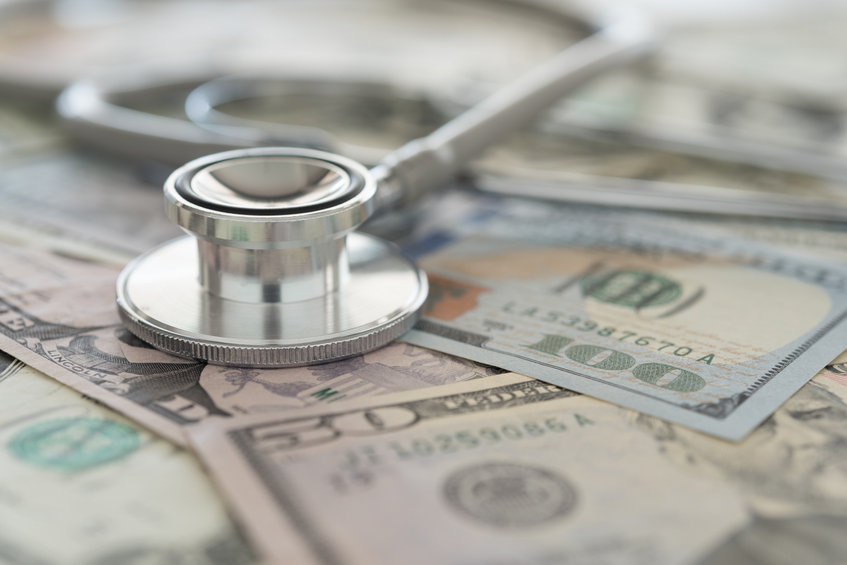What No One Tells You About Financial Health in Medical School and Residency was originally published on HospitalRecruiting.

In Medical School:
-
- Do not accrue credit card debt. This is an incredibly hard task but try to avoid this at all costs. It can be tricky if you’re supporting a family. Get a roommate, make a budget, and stick to it. Most medical schools, based on your location, provide living stipends between $10,000 – $15,000 every 6 months. During your first year, if there’s a summer break, this amount will be less, as you are not provided funds for months that you’re not in class or rotating. Credit card debt has insanely high APR (interest rates), sometimes as high as 30%+. Call your credit card companies and ask for them to lower your APR, before “life” happens.
- Build your credit score. Get a few credit cards. You will thank yourself later when buying a house or car. Put utilities on the card and accrue FLIGHT points. You will need these when applying for residency. I spent $10,000 applying for emergency medicine residency, as I had 16 interviews. Southwest is the best card to accrue points.
- Anticipate the hidden costs during medical school. Each board exam will cost you nothing less than $2,000 in exam fees, travel expenses, and study materials. During my third year, I wrecked my car in the snow, which cost me $2,000. I approached the financial department, and they let me take out a supplemental loan on my student loans. I did this because the interest on that loan is MUCH less than credit card interest.
- Get a financial advisor, someone for life.
- Get a loan officer. Do NOT make any decisions regarding your student loans, such as consolidation, refinancing, etc. unless you speak to them first. Keep and save every receipt for each payment. Loan companies are notorious for losing your payment history which will severely set you back if you enroll in the PSLF or REPAYE options. I have lost count of how many colleagues were denied their PSLF forgiveness because their paperwork wasn’t filed correctly. Do not trust the system to handle this for you; you must stay on top of it.

In Residency:
- DO NOT ACCRUE CREDIT CARD DEBT. I know you’re excited, exhausted, and happy to have a higher salary. Continue to live small with roommates.
- Evaluate the Rent to Buy Ratio. This will depend heavily on your location. Buying a house in the southeast may be wise, but in California or New York it’s better to rent.
- Take advantage of the first time home-buyer physician loan. Coming out of medical school, you have no cash, no real job, maybe no credit, and a TERRIBLE debt-to-income ratio. With this loan, you can put down less than 20% and avoid paying for private mortgage insurance (PMI). PMI is insurance you pay to protect the lender against you defaulting. This is a deductible expense, but still expensive. Be aware that your interest rate will be 0.125% – 0.25% higher than a conventional mortgage. Usually, this has no early repayment penalty, but still read the fine print.
- Get cheap disability insurance and keep it. As a young resident, you’ll get much lower rates than if you try to get this later. In residency, my rate was $60, but when I went into practice, it went up to $200+/month.
- Match your 401K. I remember feeling so tired of being broke, but this is free money. Having spent the last 10+ years in training, we are notably behind on investing and saving for retirement. Do not put this off for too long.
- At the very least, carry catastrophic health insurance. I couldn’t afford regular health insurance during medical school, and my school didn’t offer any discounted programs/rates. If you plan to have children, you’ll need good coverage.
- Moonlight, moonlight, moonlight. Not only will this give you incredible experience and insight into practicing independently, but it can be rather lucrative.
- Explore other avenues of income. There are numerous ways to make money in quick and easy ways as a physician. You can sign up to respond to HARO inquiries (help a reporter out), assist attorneys with expert medical opinion reports, act as a consult for websites, pharma, and biotech companies, etc. The list is endless, and these don’t take up too much of your time.
While this is not a comprehensive list, these are things that I’ve learned over the years.
Happy financial planning!



